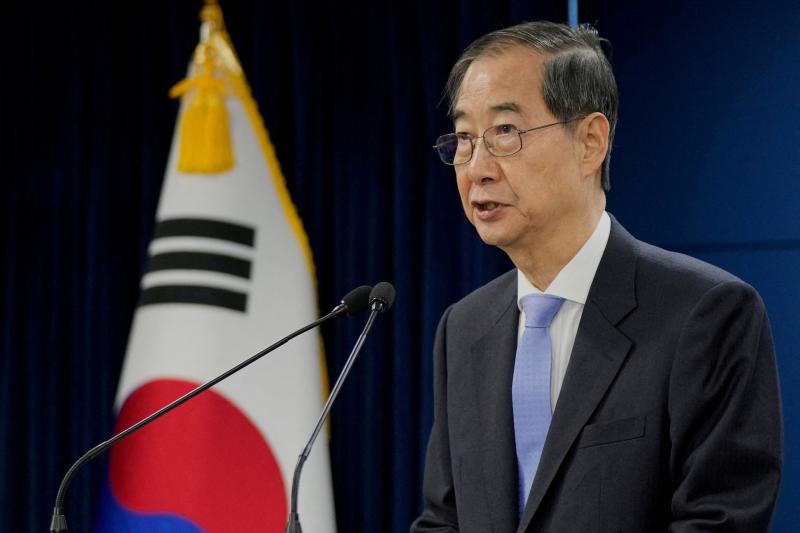South Korea's Constitutional Court reinstated South Korean Prime Minister Han Duck-soo's powers today, the latest twist in the nation's recent turbulent politics after his impeachment as acting president nearly three months ago.
Han took over as acting leader from South Korean President Yoon Suk-yeol, who was himself impeached over his short-lived declaration of martial law in December last year.
Following the ruling, Han returns to his acting president position immediately.

Photo: Reuters
"I am grateful for the wise decision made by the Constitutional Court," Han said, thanking members of the Cabinet for their hard work while he was suspended.
"We will work together to prepare and implement responses to global changes, and to ensure that South Korea continues to develop well in the era of great geopolitical transformation," Han said in the televised comments.
Yoon's martial law declaration plunged Asia's fourth-largest economy into its greatest political crisis in decades, and sparked a leadership vacuum amid spiraling impeachments, resignations and criminal indictments for a range of top officials.
Han had initially lasted less than two weeks in the post and was impeached and suspended on Dec. 27 after clashing with the opposition-led parliament by refusing to appoint three more justices to the Constitutional Court.
The justices on the court ruled today seven to one to strike down the impeachment.
Five of the eight justices said the impeachment motion was valid, but there were not enough grounds to impeach Han as he did not violate the constitution or the law, according to a court statement.
Two justices ruled that the impeachment motion against Han, who was acting president at the time, was invalid from the start as two-thirds of lawmakers in parliament did not pass it.
One justice voted to impeach Han.
Han, 75, had served in leadership positions for more than three decades under five presidents, both conservative and liberal.
In a country sharply divided by partisan rhetoric, Han had been seen as a rare example of an official whose varied career transcended party lines.
Still, the opposition-led parliament accused him of not doing enough to thwart Yoon's decision to declare martial law, an accusation he denied.
South Korean Minister of Finance Choi Sang-mok assumed the position of acting president while the cases of Yoon and Han were considered by the Constitutional Court.
Parliament impeached Han over his alleged role in the martial law, as well as his refusal to appoint more justices to the Constitutional Court and back special counsel bills targeting Yoon and First Lady Kim Keon-hee.
Han attended the only hearing in the case on Feb. 19, where he denied any role in the martial law episode and called for the court to dismiss the impeachment.
The Constitutional Court's ruling on Yoon's impeachment is expected within days.
Yoon also faces a separate criminal trial on charges of leading an insurrection by declaring martial law.
If Yoon is removed, a new presidential election is to be held within 60 days.

Indonesia was to sign an agreement to repatriate two British nationals, including a grandmother languishing on death row for drug-related crimes, an Indonesian government source said yesterday. “The practical arrangement will be signed today. The transfer will be done immediately after the technical side of the transfer is agreed,” the source said, identifying Lindsay Sandiford and 35-year-old Shahab Shahabadi as the people being transferred. Sandiford, a grandmother, was sentenced to death on the island of Bali in 2013 after she was convicted of trafficking drugs. Customs officers found cocaine worth an estimated US$2.14 million hidden in a false bottom in Sandiford’s suitcase when

CAUSE UNKNOWN: Weather and runway conditions were suitable for flight operations at the time of the accident, and no distress signal was sent, authorities said A cargo aircraft skidded off the runway into the sea at Hong Kong International Airport early yesterday, killing two ground crew in a patrol car, in one of the worst accidents in the airport’s 27-year history. The incident occurred at about 3:50am, when the plane is suspected to have lost control upon landing, veering off the runway and crashing through a fence, the Airport Authority Hong Kong said. The jet hit a security patrol car on the perimeter road outside the runway zone, which then fell into the water, it said in a statement. The four crew members on the plane, which

Japan’s ruling Liberal Democratic Party (LDP) and its junior partner yesterday signed a coalition deal, paving the way for Sanae Takaichi to become the nation’s first female prime minister. The 11th-hour agreement with the Japan Innovation Party (JIP) came just a day before the lower house was due to vote on Takaichi’s appointment as the fifth prime minister in as many years. If she wins, she will take office the same day. “I’m very much looking forward to working with you on efforts to make Japan’s economy stronger, and to reshape Japan as a country that can be responsible for future generations,”

SEVEN-MINUTE HEIST: The masked thieves stole nine pieces of 19th-century jewelry, including a crown, which they dropped and damaged as they made their escape The hunt was on yesterday for the band of thieves who stole eight priceless royal pieces of jewelry from the Louvre Museum in the heart of Paris in broad daylight. Officials said a team of 60 investigators was working on the theory that the raid was planned and executed by an organized crime group. The heist reignited a row over a lack of security in France’s museums, with French Minister of Justice yesterday admitting to security flaws in protecting the Louvre. “What is certain is that we have failed, since people were able to park a furniture hoist in the middle of